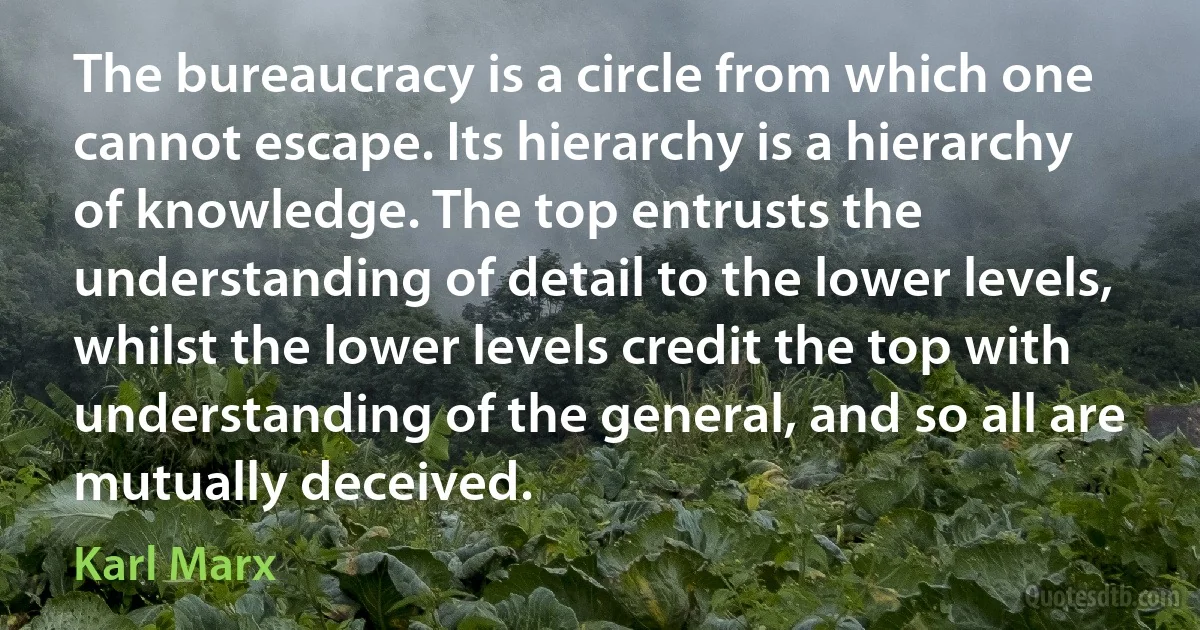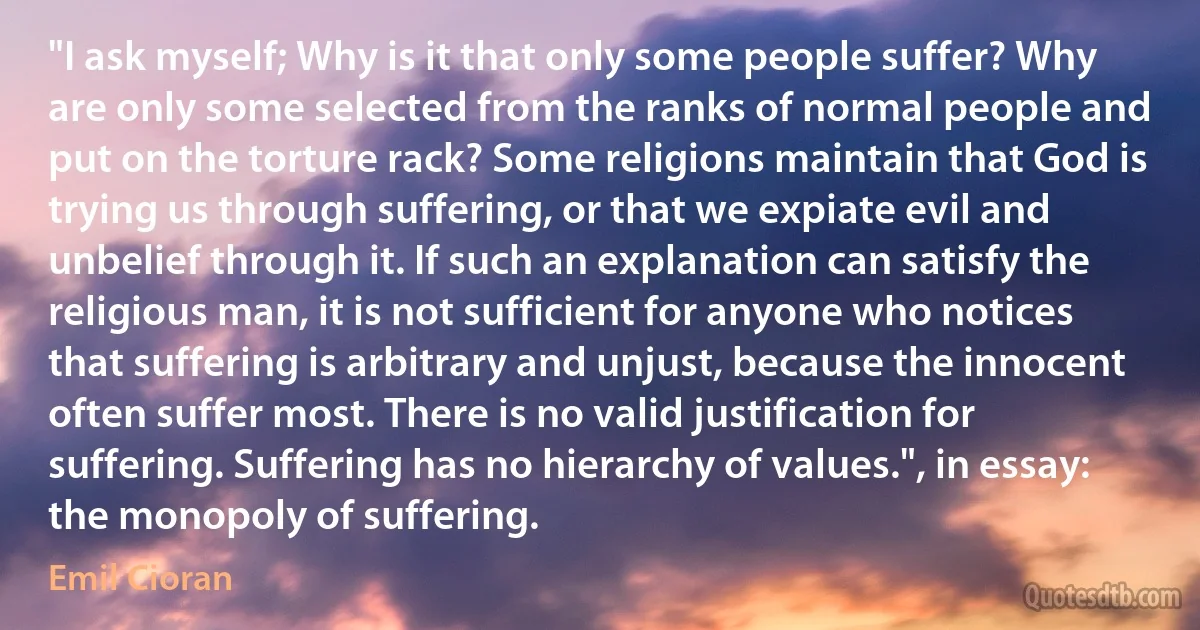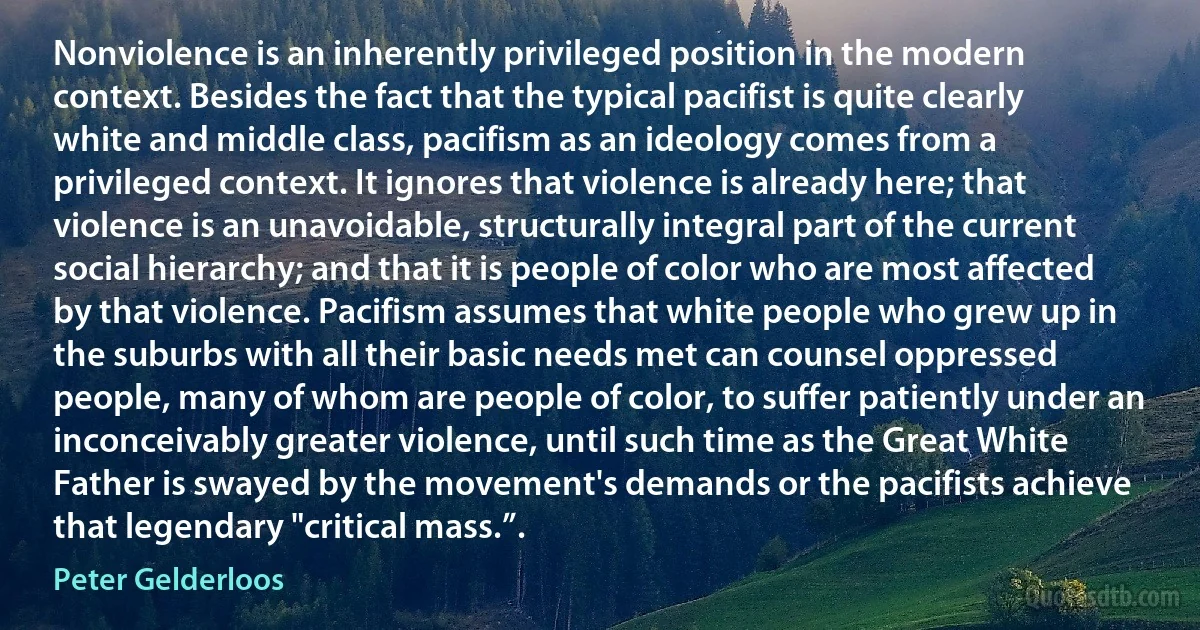Hierarchy Quotes - page 10
I have many deep thoughts in God, but I take my own measure, lest I perish by boasting... For I myself, though I am in chains and can comprehend heavenly things, the ranks of the angels and the hierarchy of principalities, things visible and invisible, for all this I am not yet a disciple.

Ignatius of Antioch
Murray Rothbard thinks egalitarianism is a revolt against nature, but his day is 24 hours long, just like everybody else's. If you spend most of your waking life taking orders or kissing ass, if you get habituated to hierarchy, you will become passive-aggressive, sado-masochistic, servile and stupefied, and you will carry that load into every aspect of the balance of your life. Incapable of living a life of liberty, you'll settle for one of its ideological representations, like libertarianism. You can't treat values like workers, hiring and firing them at will and assigning each a place in an imposed division of labor. The taste for freedom and pleasure can't be compartmentalized.

Bob Black
Imperialism
Capitalism
Faith
Rationalism
Primacy of the Spirit
Materialism
Idealism
Sensualism
Will-to-Power
Will-to-Riches
World as Object of Organization
World as Object of Plunder
Rank as Social Distinction
Society as a Collection of Individuals
Fulfillment of Duty
"Pursuit of Happiness"
Absolute Will to Biological Fertility
Race-Suicide, Birth Control, Puritanism, Bohemianism
Absolute Will to Increase Power
Surrender to the World Hegemony of the West
Hierarchy
Equality
Discipline
Freedom, Ethical Laissez-Faire
Authority
Parliamentarism
Aristocracy
Plutocracy
Society as Organic Unity
Class War
Sexual Polarity
Feminism
Europe as Imperium
Petty Statism
Europe as Nation
Chauvinism
Europe as Fatherland
Petty Nationalism
Order
Freedom
Stability
Constant Motion, Business Cycles
Art Practiced in Conformity with the Cultural Task
"L'Art pour l'Art"
Politico-Military Expansion
Financial-Military-Economic Expansion.

Francis Parker Yockey
Tribal endogamy explains the Hindu caste system. As Vedic society, an advanced and differentiated society characterized by class (varna) hierarchy, expanded from the Northwest into India's interior, it absorbed ever more tribes but allowed them their distinctive traditions and first of all their defining tradition, viz. their endogamy. This way, endogamous self-contained units or tribes became endogamous segments of Hindu society, or castes.

Koenraad Elst
Magic. The great "Science”. According to Deveria and other Orientalists, "magic was considered as a sacred science inseparable from religion” by the oldest and most civilized and learned nations. The Egyptians, for instance, were one of the most sincerely religious nations, as were and still are the Hindus. "Magic consists of, and is acquired by the worship of the gods”, said Plato. Could then a nation, which, owing to the irrefragable evidence of inscriptions and papyri, is proved to have firmly believed in magic for thousands of years, have been deceived for so long a time. And is it likely that generations upon generations of a learned and pious hierarchy, many among whom led lives of self-martyrdom, holiness and asceticism, would have gone on deceiving themselves and the people (or even only the latter) for the pleasure of perpetuating belief in " miracles”? ...

Helena Petrovna Blavatsky
A sense of social hierarchy prevented Mrs Munde from actually telling the lousy bastard to get out, so instead she began to think evil thoughts. She had once read an article on mind control, explaining that the best way to bend someone to your will was to think of a gooey mudlike substance called Cliff Richard and direct it at the object of your intent. Such were the marshmellow-suffocating properties of this image that the victim fell instantly into an undignified froth. Putty in your hands in fact. It didn't seem to work. The stranger was insensitive as well as intrusive. Mrs Munde gave it one last go till the kitchen air was thick with Cliff Richard. The stranger suddenly made a little squeaking noise and fell sideways.

Jeanette Winterson
The man who spearheaded the Hare Krishna empire, Prabhupada, espoused some very controversial views that would likely upset, and even outrage, those who are otherwise sympathetic to spiritual endeavors and theology...Even if some of his comments were taken out of context (as his defenders and apologists sometimes assert), the sheer volume and magnitude of his immense bigotry cannot be ignored nor sugar-coated. Part of Prabhupada's hatred of blacks stemmed from his deep-seated Hindu beliefs that dark-skinned peoples represent the very bottom of the hierarchy of the human race -- a direct reflection of India's ancient color-based caste system.

A. C. Bhaktivedanta Swami Prabhupada
But the hatred of women is a source of sexual pleasure for men in its own right. Intercourse appears to be the expression of that contempt in pure form, in the form of a sexed hierarchy; it requires no passion or heart because it is power without invention articulating the arrogance of those who do the fucking. Intercourse is the pure, sterile, formal expression of men's contempt for women; but that contempt can turn gothic and express itself in many sexual and sadistic practices that eschew intercourse per se. Any violation of a woman's body can become sex for men; this is the essential truth of pornography.

Andrea Dworkin
I hope all who read this book will receive the inspiration that we who have prepared it have received; I hope also that their confidence in the Hierarchy and in the existence of Christ and His Disciples, the Masters, may receive such an impetus that many more will attempt to tread the Way and join the great number of aspirants in every country who are seeking to tread the Path by becoming the Path Itself.

Alice Bailey
The times are serious and the world disciples are hard pressed. The Hierarchy and its affiliated groups are seeking active help and cooperation in the work of salvage. All disciples and aspirants are needed, and all can give much if the desire, the loving heart and the consecrated mind are united in service. I ask aid in the task of reconstruction. I ask for your consecrated help. I ask you to discipline yourselves anew, to hold back nothing, either objective or subjective. I ask for your wholehearted cooperation in the work of world salvage.

Alice Bailey
These words sound simple, but the "Forces of Light" is the name for certain new Powers which are being invoked by the Hierarchy at this time, Whose potencies can be brought into great activity at the May full moon if due effort is made. The Spirit of Peace which is invoked is an inter-planetary Agent of great power Whose cooperation has been promised if all aspirants and disciples can cooperate to break through the shell of separation and hatred which holds our planet in thrall.

Alice Bailey
I feel enormous joy and exhilaration. This is so different from the poetry world into which I was growing up in the 1940s and 1950s. That was a world dominated by a few major figures, mostly from a certain class and of course male: Pound, Williams, Eliot, Stevens. I was saying to a young man, a poet working here, "Your generation doesn't have to look at the field of poetry as a hierarchy. You can draw from this enormously rich cluster of poetries, and you can enrich yourself from so many kinds that this is a wholly different situation than we had in the 1940s and 1950s."

Adrienne Rich
War is the health of the State. It automatically sets in motion throughout society those irresistible forces for uniformity, for passionate cooperation with the Government in coercing into obedience the minority groups and individuals which lack the larger herd sense. The machinery of government sets and enforces the drastic penalties. ... [I]n general, the nation in wartime attains a uniformity of feeling, a hierarchy of values culminating at the undisputed apex of the State ideal, which could not possibly be produced through any other agency than war. Other values such as artistic creation, knowledge, reason, beauty, the enhancement of life, are instantly and almost unanimously sacrificed, and the significant classes who have constituted themselves the amateur agents of the State, are engaged not only in sacrificing these values for themselves but in coercing all other persons into sacrificing them.

Randolph Bourne
Surplus matter. I'd forgotten all about that phrase, those classes-even before the accident, I mean. After the accident I forgot everything. It was as though my memories were pigeons and the accident a big noise that had scared them off. They fluttered back eventually-but when they did, their hierarchy had changed, and some that had had crappy places before ended up with better ones: I remembered them more clearly; they seemed more important.

Tom McCarthy (writer)
The historical Christ, then, is a glorious Being belonging to the great spiritual hierarchy that guides the spiritual evolution of humanity, who used for some three years the human body of the disciple Jesus; who spent the last of these three years in public teaching throughout Judæa and Samaria; who was a healer of diseases and performed other remarkable occult works; who gathered round Him a small band of disciples whom He instructed in the deeper truths of the spiritual life; who drew men to Him by the singular love and tenderness and the rich wisdom that breathed from His Person; and who was finally put to death for blasphemy, for teaching the inherent Divinity of Himself and of all men.

Annie Besant
...It's more that the conventionality of the model makes it a domesticized view of desire and also that really what we want is the same things as heterosexuals: the nuclear family, marriage; all of these components which from a feminist perspective we've already critiqued. Not every lesbian is a feminist, but if every lesbian were a feminist they shouldn't want this either, because it really contradicts a whole movement that critiqued the nuclear family and the hierarchy of the nuclear family...

Cherríe Moraga
This group of perfected men is known by many names: the Masters of Wisdom and the Lords of Compassion, the Great White Brotherhood, the Society of Illumined Minds, the Spiritual or Esoteric Hierarchy, the Guides and Elder Brothers of Humanity.... They have beneficently overseen the evolution of humanity for countless millennia.

Benjamin Creme
Egypt was the home of magic - Atlantean magic... Black magic was tremendously rampant in Atlantean times, and ...there was a great war, between the forces of Light and Darkness, which brought that civilization to an end. As a result of that war the Hierarchy of Light became occult. They removed Themselves from the everyday world to Their mountain and desert retreats, leaving mankind to fend for itself, and to learn through trial and error. They return now among us, one by one.

Benjamin Creme



